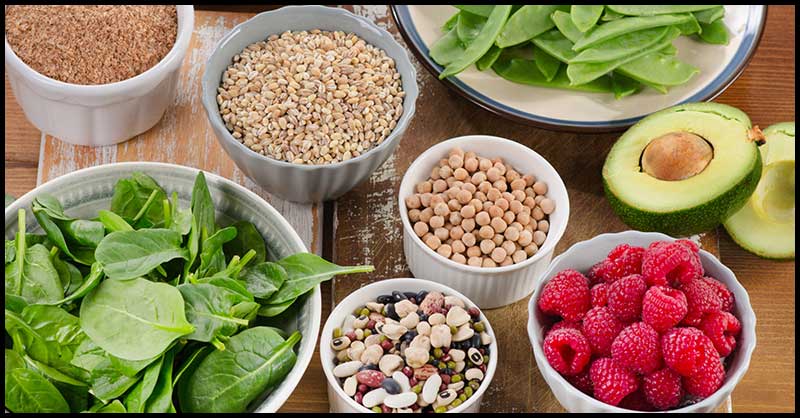Dietary fiber includes the parts of plant foods our body can’t digest or absorb. Instead of being digested by the body, fiber passes relatively intact through our stomach, small intestine, and colon and out of our body (1 ).
There are two types of fiber – soluble fiber and insoluble fiber. Soluble fiber easily dissolves in water and is broken down into a gel-like substance in the part of the gut known as the colon(2). Foods rich in this type of fiber include nuts, beans, apples, and blueberries.
On the other hand, insoluble fiber refers to a fiber that cannot dissolve in water or another liquid (3). We can find them in nuts, beans, and vegetables such as cauliflower, green beans, and potatoes.
Consuming a high fiber-diet can offer our body numerous health benefits.
In a study, experts have found that individuals with high intakes of dietary fiber appear to be at significantly lower risk for developing coronary heart disease, stroke, hypertension, diabetes, obesity, and certain gastrointestinal disease (4).
Still not convinced? Here are the more detailed benefits of filling our plates with fiber-rich foods.
Helps Lower Cholesterol Levels
Soluble fiber may help lower total blood cholesterol levels by lowering low-density lipoprotein. Studies revealed that high-fiber foods may have other heart-health benefits, such as reducing blood pressure and inflammation (1).
Can Help Reduce Blood Sugar Spikes After A High-Carb Meal
High-fiber foods tend to have a lower glycemic index than refined carb sources, which have been stripped of most of their fiber (5).
In a 2008 study, results showed that including viscous, soluble fibers in our carb-containing meals may cause smaller spikes in blood sugar levels (6).
Reduces The Onset Of Constipation
Some of us complain about constipation. When it comes to this, fiber can help us poop softer and bulkier – both of which speed its passage from our body (7).
Aids In Achieving A Healthy Weight
Aside from filling us up and keeping us satisfied for a longer period of time, fiber also prevents our body from absorbing some of the calories in the foods we eat. It works by binding with fat and sugar molecules as they travel through our digestive tract, which reduces the number of calories we actually get (7).
Sources:
- https://www.mayoclinic.org/healthy-lifestyle/nutrition-and-healthy-eating/in-depth/fiber/art-20043983
- https://www.medicalnewstoday.com/articles/
- https://study.com/academy/lesson/what-is-soluble-fiber-definition-sources-examples.html
- https://pubmed.ncbi.nlm.nih.gov/19335713/
- https://www.healthline.com/nutrition/why-is-fiber-good-for-you#TOC_TITLE_HDR_5
- https://pubmed.ncbi.nlm.nih.gov/18287346/
- http://www.eatingwell.com/article/287742/10-amazing-health-benefits-of-eating-more-fiber/









